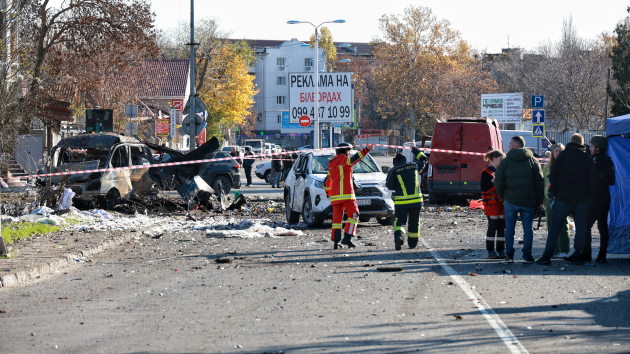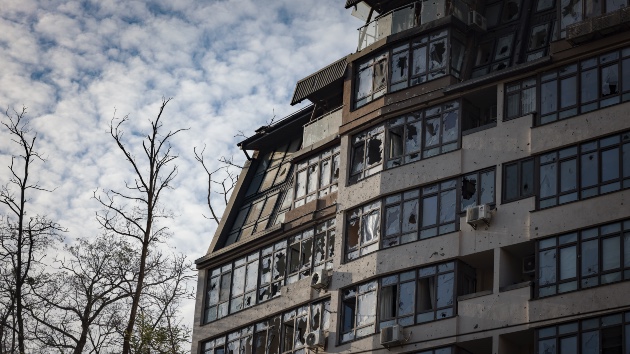Palestinians flee villages as settler violence surges in West Bank amid war
Written by ABC Audio ALL RIGHTS RESERVED on December 20, 2023

(KHIRBET ZANUTAH, West Bank) — A Palestinian village school had been ransacked and a dozen houses nearby were abandoned. In some, a few belongings remained: a mattress and children’s shoes.
This was Khirbet Zanutah in the West Bank which has been under Israeli military occupation for decades. In late October, its roughly 250 residents fled, packing up their homes, saying attacks and threats from Israeli settlers had become intolerable, according to villagers.
“They said to us, ‘If you don’t leave, we will come in the night and shoot you all,” Faris Samara, who had lived in Khirbet Zanutah, told ABC News. “We had no choice but to leave.”
The small village is one of over a dozen Palestinian villages in the Israeli-occupied West Bank that have emptied since the surprise Hamas terror attack on Oct. 7. Over 1,000 residents have fled the West Bank, saying they have been forced from their homes by a surge in Israeli settler violence and intimidation, left unchecked by Israel’s security forces, according to the United Nations and the Israeli human rights group B’Tselem.
At least 270 people have been killed in the West Bank since Oct. 7, according to the Palestinian Ministry of Health.
This is part of a broader push in the West Bank by extreme settlers trying to take advantage of the war to increase pressure on Palestinian communities, exploiting an atmosphere of impunity following the Hamas massacre, according to residents, human rights groups and experts.
Residents and human rights groups accuse far-right Israeli leaders, some of whom hold key positions in Prime Minister Benjamin Netanyahu’s government, of fanning the campaign. The Hamas attack has emboldened Israel’s far right, with extreme views now sometimes voiced in the mainstream, with far-right leaders — including some government ministers — calling for the permanent resettlement of Palestinians from Gaza.
It has broader implications: beyond the human toll, it threatens to scuttle any international hopes — led by the United States — for a new two-state solution to emerge after the war.
“I think the settlers right now are in an orgy,” Gideon Levy, a prominent journalist at Israel’s liberal Haaretz newspaper, told ABC News. “They understand, that’s their money time. That’s their big opportunity.”
ABC News was brought to the abandoned village on a media tour by an Israeli settler group, Regavim. The non-governmental organization, which says its mission is “to protect Israel’s land and natural resources,” was keen to show a group of journalists from different outlets why it thought it was good the villagers were gone.
Regavim has campaigned for years to remove the villagers, accusing them of squatting illegally on a Jewish archaeological site and lacking proper building permits.
Naomi Kahn, Regavim’s international division director, told reporters on the tour that “no settler ever stepped foot anywhere near here” and “no violence ever occurred here,” that the people living in the village were no longer supported by the Palestinian authority when the conflict started.
“When the war broke out, the people living here who were no longer supported by the Palestinian authority that is otherwise engaged right now realized that it was not in their best—that it was possible they would be relocated forcibly or they were afraid that the demolition orders would actually be enforced,” Kahn said.
“It has nothing to do with individual settlers, vigilantes, violence of any kind,” she added.
But the villagers tell a very different story.
“On October 7, the [Israeli] settlers went crazy,” Faris Samara told ABC News. “They came with army, came in a group, and anyone who would go outside they would beat up and kick out.”
Most of the villagers were shepherds, Sarama said. Settlers had harassed the village for years, he said — bringing their sheep to graze on the land and sometimes opening water tanks — but after the attack, the campaign dramatically escalated.
“They would come at night. Not just one, but 30 or 40 of them. They come with guns,” he said. “They beat people up.”
Samara said the settlers punched holes in the shepherds’ water tanks and smashed electricity boxes.
His 9-year-old son, Ali, told ABC News, that a settler had hit him and threatened him with a gun.
Israel has occupied the West Bank since 1967. Khirbet Zanutah is located in the 60% of the West Bank that is under full Israeli military control, known as Area C. The villagers had gone to court to fight efforts to evict them for years, including petitioning Israel’s Supreme Court. The European Union had funded the village school as part of a program protecting Palestinian villages seen as “at risk of forcible displacement.”
Since ABC News visited the school, it has been set fire to and then bulldozed along with most of the rest of the village.
Samara and his 18 children now live in a nearby Palestinian village. They brought their 200 sheep with them to their new home, but they had no place to leave them outside.
Across the West Bank, Palestinians express fear of emboldened settlers, accusing Israeli security forces of failing to prosecute attackers and sometimes directly joining in harassment and intimidation.
‘It’s about displacement’
Since Oct. 7, Israeli security forces have placed most neighborhoods in the city’s H2 district, which is under Israeli military control, under an extreme lockdown, the harshest in decades. Hebron was already one of the most restrictive places for Palestinian residents, where a settler community lives inside the Palestinian city.
The area’s streets were deserted except for frequent Israeli patrols when ABC News visited. Residents have reported being confined to their homes by Israeli soldiers, who raise their guns at them if they try to step outside.
“It used to be a ghost town, now it’s worse!” Issa Amro, a well-known Palestinian peace activist, told ABC News on a street of homes with the shutters pulled.
On a nearby Palestinian house, a Star of David symbol had been sprayed on in blue paint.
“People don’t work. They don’t go to school. We have no life,” he said.
Amro — who was filmed by a New Yorker reporter being assaulted by an Israeli soldier in February — said harassment had increased since far-right leaders had joined Netanyahu’s government last year. The Israel Defense Forces said it later jailed the soldier for 10 days and suspended him from duty over the incident.
But after the Hamas terror attack, the war had supercharged the harassment, he said.
He said that on Oct. 7, Israeli soldiers and settlers in uniform had handcuffed and then beaten and humiliated him over 10 hours.
“Spitting on me. Hitting, punching me in the face,” he said.
Amro also said a soldier had sexually assaulted him.
The IDF declined to comment directly on Amro’s allegations but said its forces abide by international law.
“Everyone talks about settler violence. It’s not only settler violence. It’s government violence,” Amro said.
“It’s about displacement. They want this area without the Palestinians,” he said.
The likelihood of a two-state solution
Before the war, to keep his government coalition together, Netanyahu gave key positions to extreme far-right leaders: Itamar Ben-Gvir as minister of national security and Bezalel Smotrich as finance minister.
Long on the fringe of Israeli politics, both men are known for their extreme positions and inflammatory calls for greater Palestinian displacement. Ben-Gvir, a settler himself, has previously been convicted of incitement to racism and for supporting a banned violent Jewish militia. He now oversees Israel’s police and Border Police.
The far-right’s expanding influence in the West Bank threatens to derail international hopes for a political solution to the Israel-Hamas conflict if and when the war ends.
The U.S. State Department this month announced visa bans were being imposed on some extreme settlers linked to violence, as President Joe Biden has publicly urged Israel’s government to rein in the settlers.
The Biden administration has said after the war Israel must make a new effort for a two-state solution. But Netanyahu, who already has spent most of his political career sabotaging the possibility of a Palestinian state, has already signaled opposition to it. His far-right allies, on whom the coalition that keeps him in power depends, are also vehemently opposed.
That is likely to become an increasingly key flashpoint with the Biden administration. Biden said at a fundraising event this week that Netanyahu needed to change his government and should remove the far-right elements, naming Ben-Gvir by name.
“The two-state solution from my point of view died [a] long time ago because you have got 700,000 Jewish settlers in the West Bank and there is no room for a Palestinian state just because of this,” Levy said. “It would likely take the U.S. threatening to withhold military aid to have a chance of forcing Israel’s current government to seek a political solution.”
“Right now, it’s very hard to think in terms of hopes,” Levy added.
Copyright © 2023, ABC Audio. All rights reserved.

 KVSP
KVSP 



